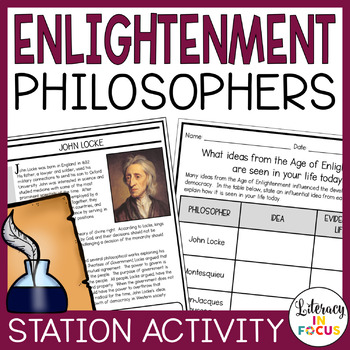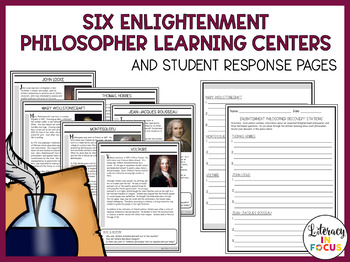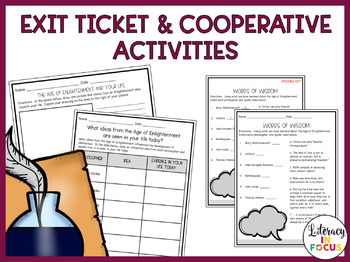Enlightenment Philosophers | Age of Enlightenment Stations and Writing Activity
- PDF
What educators are saying
Description
Conquer a difficult topic with station rotations! Students focus on a different Enlightenment thinker at each station, answering text-based questions to ensure understanding. After rotating through all six stations, students are ready to connect ideas from Age of Enlightenment to today’s world. Everything you need for a comprehensive lesson is included!
WHAT TEACHERS ARE SAYING ABOUT THIS PRODUCT:
♥ My students, my Principal, and I all loved this activity!! GREAT resource!
♥ Great activity! It was a great way to get my 7th graders thinking and talking about a difficult topic! Thank you!
♥ This was a great way to get my students up and moving on a Monday morning and engaged in a difficult topic!
♥ I found this to be an excellent activity to use in my classroom. My students enjoyed it and seemed engaged throughout. I also liked how the students had to make a connection to their personal lives. I highly recommend it
INCLUDED WITH YOUR PURCHASE:
Enlightenment Philosopher Stations: 6 Enlightenment philosopher stations are included. Each station highlights the life and philosophy of an Enlightenment thinker and includes three text-based questions. The station posters can be blown up to a larger size, displayed on a tablet/computer, or multiple copies of each poster can be made for each station. Enlightenment philosophers included in this set: Thomas Hobbes, John Locke, Jean-Jacques Rousseau, Mary Wollstonecraft, Montesquieu, and Voltaire.
Discovery Station Answer Sheet: An organizer is provided for students to record their answers at each discovery station.
Age of Enlightenment Exit Ticket: The exit ticket can be used as a formative assessment after completing the Enlightenment philosopher station rotations. Students are asked to draw a picture and explain how one Enlightenment idea impacts their life. Two exit tickets fit on one page.
Age of Enlightenment Graphic Organizer: After completing the station rotations, students work cooperatively to fill in the graphic organizer. The organizer requires students to analyze each philosopher and provide an idea that connects with today’s world. The organizer also sets students up to be successful with the writing assessment.
Enlightenment Philosopher Words of Wisdom: The Words of Wisdom worksheet can be used to review each philosopher. Based on the knowledge gained during the station rotations, students match each quote with the correct philosopher.
Age of Enlightenment Guided Writing: A paragraph outline is provided to guide students as they compose their paragraph. The prompt asks students to explain two Enlightenment ideas and describe how those ideas can be seen in their life.
Writing Rubric: The writing rubric provides students with clear expectations and guidelines for completing the paragraph.
RESOURCES YOU MIGHT BE INTERESTED IN:
Biography Research Template and Project
Root Words, Suffixes, and Prefixes Unit Bundle
Historical Travel Brochure - Template and Research Project
Want a FREE resource each month? Click HERE to follow Literacy in Focus, and you will be sent the monthly freebie!
Thank you!
©Literacy In Focus





